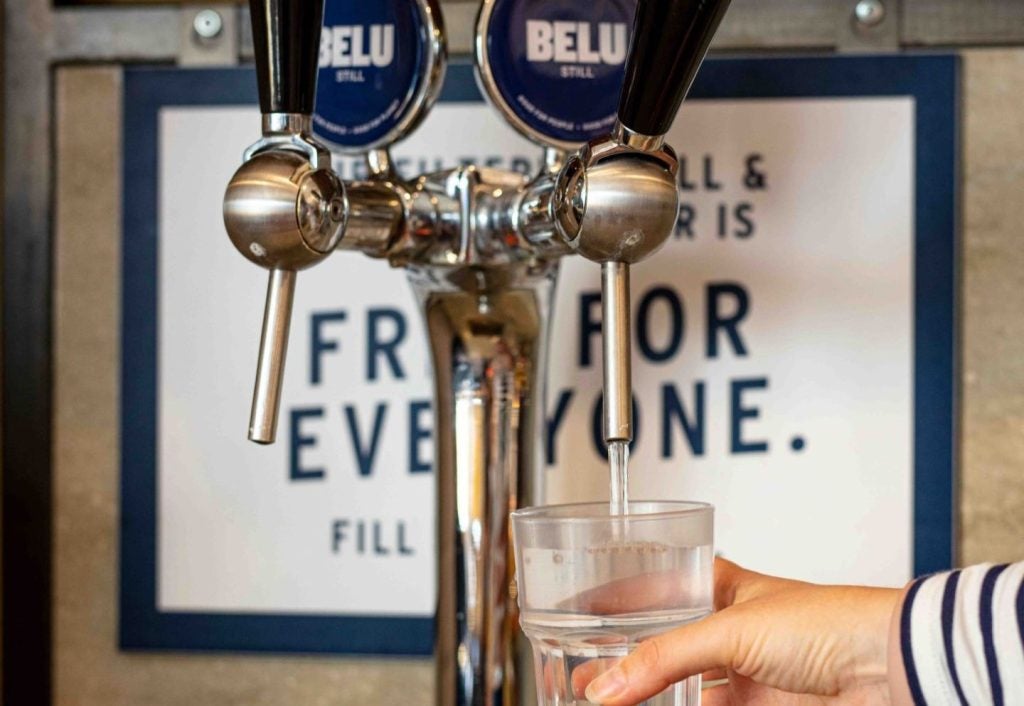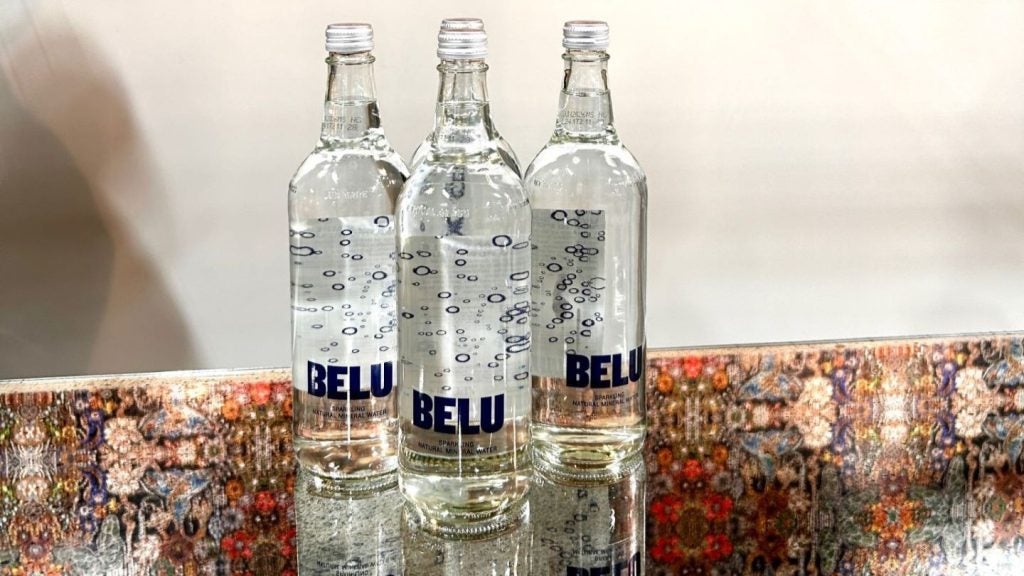
Founded in 2002, UK-based water business Belu’s growth strategy eschews the export any of its packaged products, following a made in the UK, sold in the UK approach, distributing exclusively with hotel, restaurant and catering venues.
The group has, however, been building its overseas presence through its filtration business in Hong Kong and Singapore, again, through on-trade customers.
Environmental and social impact has been core to Belu’s business strategy since it became a social enterprise in 2007. Since 2011, it has also committed to granting 100% of its net profits to the WaterAid charity, giving over £6m ($7.8m) to the charity.
While sticking to the UK for its packaged products and to selective on-trade channels for distribution may seem restrictive, Belu’s revenues continue to grow. In 2024, they were up 13% year on year to almost £10m ($12.3m).
Just Drinks sat down with co-CEO Natalie Campbell to discuss her outlook for the water market, Belu’s growth plans, and the group’s frustration around the UK’s Extended Producer Responsibility (EPR) scheme for packaging.
Fiona Holland (FH): What are your main growth ambitions for the year?
Natalie Campbell (NC): Last year, it looked pretty bleak because of EPR and some of the other taxes, because it just made the cost of doing business too difficult…Strathmore has ceased production, it’s tough, it’s challenging.
However, this is where I believe the purpose of Belu has meant we weathered some of the storm. Q1 has been pretty good for us. Lots of people have decided that they’re either switching to filtration and they want to work with us, as opposed to anyone else, or we’ve been included in some quite sizeable tenders for mineral water, because people are looking at the overall impact of our business. They’re interested in the way we’re doing WaterAid, or they’re interested in our nature-based solutions investments. They’re interested in the way we operate as a business and the social impact story as a whole.
It’s been a pretty good start to Q1. Growth for us is really stability, and ideally, we start to see some changes. That means it’s easier to operate, but we’ll need to see.
I think Belu is limited… other drinks businesses that you’d speak to would say, ‘we’re launching in the US, or we’re going here, we’re going there,’ because they’re taking a product to that territory. Because we essentially don’t do that, it’s not an option for us to grow.
FH: Would you be looking to develop your relationships with hospitality venues, hotels?
NC: At the moment, most of our contracts are a year or two years, getting people to think long-term, three to five years, and going on that journey with us. So, investing in a UK-based business, if they’re a UK-based hotel group, and they want to get closer to their supply chain… Those sorts of partnerships for us [are] in the growth bucket, they’re not new things for us in terms of how we operate as a business, but they would absolutely constitute to us growing.
FH: Belu is also in Singapore and Hong Kong with its filtration systems. How do you plan to grow there? Will you develop the filtration side of business?
NC: Absolutely, really leaning into where they’re going from a sustainability perspective and taking on more of the contracts for the hotel groups. It’s a really dynamic market. There are more Michelin star restaurants that are opening, so there’s a really exciting opportunity. It’s a smaller market than the UK but, again, for us, it’s not about growth and let’s go big. It’s where does it make the most sense? How can we tell a story around other ways to be in food and beverage and still provide that excellence in service whilst also layering on sustainability?
FH: Are there any other markets in that region that you’re looking to open up the filtration side of the business?
NC: Definitely exploring Australia… it’s a really dynamic market with really strong sustainability regulation. There’s definitely an opportunity there. I think it depends on where we start to see some of the hotel groups move to.

FH: What is your general view on the wider drinking water category?
NC: Because the utility companies can’t get their sh*t together, more people are drinking packaged water. That’s what the data shows. We’re seeing it in sales uplift. The challenge is, they’re drinking it in virgin plastic. The cheaper brands that are selling it in the source of plastic that does not have any form of environmental efficacy, that’s where the most growth is. That’s part of the challenge but also then an opportunity to then tell the story of packaging, which we do.
It’s likely that we will enter the market in cans. We have been not the loudest proponents of cans previously, partly because we didn’t have the infrastructure to make and fill in the UK, and that’s still a challenge. But also, we don’t recycle aluminium particularly well in the UK, so we’re shipping it all back out. It was never the most environmentally sustainable option. RPET is the lowest carbon and is UK-made and, if you’re filling it in the UK, that for us was the option that we decided to stay in and we explained why. We’re now looking at cans. The UK infrastructure for making it has got better.
There’s still lots of issues on the recycling infrastructure but we’re working on that. It also means that if the glass market does completely collapse, that as a business, we can still operate. That is where the commercial conversation has been quite vigorous perspective but we’ve taken the position that, if we exited the market, then all we do is leave a vacuum for other brands to enter it that have zero environmental impact.
I think there’s going to be a massive boom when it comes to adaptogens being added to water
If there are any changes around packaging for us, it will be in cans and then the broader carbonated drinks with a base on water. I think there’s going to be a massive boom when it comes to adaptogens being added to water. We’ve seen the sort of the CBD flavour experimentation. We went into tonics and mixers and then withdrew. It’s a really challenging market but I think soft drinks, and we’re seeing it in the US, the sodas, adult sodas with less sugar… That is going to be a growth.
The sceptic in me [believes] most people are not experts when it comes to water, and what a lot of people will be sold is basically tap water in a can with stuff added… Actually, if you drink mineral water, you get most of those vitamins anyway, but then there’s a premium to it, and there’s some lovely packaging, so we’ll see lots of that popping up. Those are the businesses that want to enter the market, get as big as possible, and then sell to, a multinational, and they will come and go. What I hope we’ll start to see are the brands that we, love and respect… that really do open up a category and have an interesting conversation.
FH: Belu’s potential move into cans: is that driven by consumer interest?
NC: The growth is in plastic. Consumers drink water out of plastic. Generally, if they’re in an establishment by a dining like a cafe or dining venue, they’ll prefer it in glass… That trend has not changed. The canned water market in the UK isn’t particularly huge. The bit that will influence the shift is EPR, so if glass becomes too expensive to operate, it has to then the only option is to move really and to, especially for venues that are plastic-free.
FH: What’s your take on the EPR scheme which is just coming into play in the UK?
NC: If we look at the system at the moment, when it comes to packaging, there are three essential taxes, so we’ve got EPR, PRNs and then the DRS scheme that will be coming through. For a business like ours, those schemes… because it’s about getting people to reuse, recycle, supporting waste infrastructure, whilst we endorse the intent, what it actually does is create three layers of costs within the business without actual transparency around where any of the money is going.
There is a whole intermediary economy starting of people just taking money to consult on how to get through paying less EPR and all of this other stuff
One of the things that’s happening is there is a whole intermediary economy starting of people just taking money to consult on how to get through paying less EPR and all of this other stuff. What’s not happening is the actual clear instruction around what waste infrastructure is actually is going to be invested in, so for local authorities who are supposed to be the beneficiaries of the EPR funding… are they going to be building new infrastructure for us to recycle more aluminium? Are they going to be building more infrastructure for people in communities to be able to recycle and separate their packaging in a better way?
The other bit that we pointed out in a recent letter, and we sent it to the Chancellor…is ultimately, the cost is going to be passed back to the consumer. Two cycles ago, we saw an increase in inflation because of cost prices in soft drinks. That is a direct correlation between everyone just adding a percentage for EPR. No one knows what the actual figure is and so there are big systems consequences for what feels like a very small decision and it was taken before this government even came in.
What we’re saying is just pause, consult, consolidate the three individual EPR, PRN and DRS, so that it makes sense to businesses, the businesses with the broader shoulders by the Coca-Colas and the PepsiCos of this world pay their fair share, and there is absolute clarity on how the recycling and circular economy infrastructure is going to be better, because without that, all of this doesn’t mean anything, and all you do is push everyone into virgin plastic because it’s the cheapest.

FH: Where are Belu’s products made?
NC: We’re a short supply chain, UK-based business, so our glass bottles, all of our bottles are made [with a third-party bottler] in the UK, in Chester, and our water source is on the Welsh/English border. For us, it’s one of the things that we talk about quite vocally. A lot of the drinks products, water products, are in imported glass. Either empty containers are shipped into the UK and filled here, or in some cases, and not just glass products, but also RPET products and aluminium products, they’re filled in the EU, or just outside of the EU, and shipped in into the UK. For us, made in the UK, filled in the UK, is really important, and then working with supply partners that are pushing towards their own not even net zero goals but zero-carbon journey goals is important.
Then our filtration machines, some of them are made in the UK as well. Obviously, the component parts come from all over the world, and some of our machines are made in Italy, so that’s one of the only things that that we import. The way that we offset that is filtration machines. Ultimately, you’re refilling a glass vessel, so you’re not actually then using a single use container at the point of use, so that’s the trade-off there.
FH: You mentioned Belu used to be in tonics and mixers. Would adaptogens be something of interest for the business at some point?
NC: I think we will if we can work out the environmental efficacy of the cans and we’re 99% there. We will probably take two of our flavours that we had in tonics and mixers, the gingerbread and the lemonade, and create a sort of a soft drink can version, and then that opens up the pathway to start looking at other sorts of drink mixes.
The challenge will always be: can we do it in an environmentally sound way? What I don’t know at this moment is the production cycle of these adaptogens. The value chain, you know, is it a fair wage, fair trade, supply chain? All of those things have to be be right for us to do anything. When we moved into tonics and mixers, that was really important. The ingredient provenance was key. Then in terms of the story, how do we make sure that, if we were selling that sort of product, there is a health benefit. A lot of these things have been sold based on health benefits.
FH: Would retail ever be on the cards for Belu?
NC: This is the environmental trade-off. We could absolutely try and get into retail in other RPET formats. We just don’t believe we need more packaged water in either virgin plastic or even RPET at volume, and we would rather that you could drink the water out of your tap if you were at home, that’s the best environmental option. Really, you need water to drink it, so let’s make sure that it’s available without needing to be packaged.
It’s a real tension. For us, we could double our revenue if we went into retail, but it doesn’t feel right now for us. We haven’t gone in glass because it devalues the premium element of what we offer B2B. Not everyone feels that way, so you can get some of our competitors in retail but, for us, we’re a hospitality, workplace-first brand… Never say never but there would need to be a significant shift in the infrastructure, whether that’s waste or the sort of plastic we’d go in, or some sort of new innovation that would make it an environmentally viable option.


